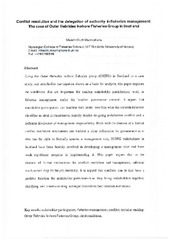Conflict resolution and the delegation of authority in fisheries management: The case of Outer Hebrides Inshore Fisheries Group in Scotland
Permanent lenke
https://hdl.handle.net/10037/10896Dato
2016-08Type
Journal articleTidsskriftartikkel
Peer reviewed
Forfatter
Msomphora, Mbachi RuthSammendrag
Using the Outer Hebrides inshore fisheries group (OHIFG) in Scotland as a case study, and stakeholder participation theory as a basis for analysis, this paper explores the conditions that are important for making stakeholder participation work in fisheries management, under the 'modem governance context'. It argues that stakeholder participation can function well under less than what the research literature identifies as ideal circumstances, namely despite on-going stakeholder conflict and a deficient devolution of management responsibility. Even with the absence of a formal conflict resolution mechanism and without a clear delineation by government as to who has the right to formally assume a management role, OHIFG stakeholders in Scotland have been heavily involved in developing a management plan and have made significant progress in implementing it. This paper argues that in the absence of formal mechanisms for conflict resolution and management, informal mechanisms may do the job. Secondly, it is argued that conflicts can in fact have a positive function for stakeholder participation as they bring stakeholders together, clarifying and communicating amongst themselves their interests and values.


 English
English norsk
norsk